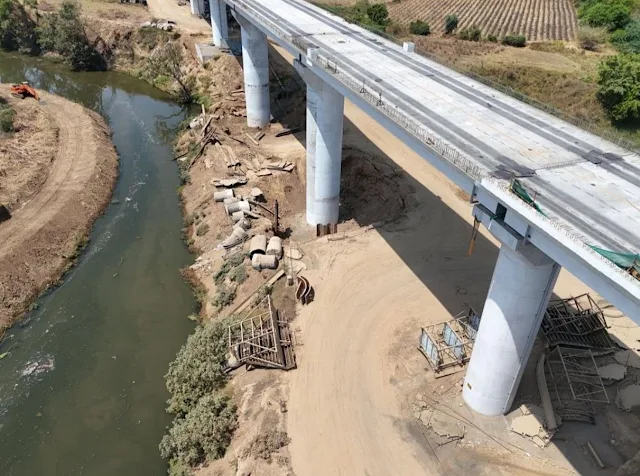By Rajiv Shah
The Vishwamitri Committee, formed by the Gujarat State Human Rights Commission, has submitted two supplementary reports on June 5, 2025, detailing efforts to rejuvenate the Vishwamitri River in Vadodara, considered Gujarat's cultural capital. The reports (click here and here) respond to directives from a May 26, 2025, GSHRC hearing. Comprising environmentalists, urban planners, and zoologists like Neha Sarwate, Rohit Prajapati, Dr. Ranjitsinh Devkar, Dr. Jitendra Gavali, and Mitesh Panchal, the committee focuses on mitigating pollution, stabilizing riverbanks, managing flood risks, and preserving biodiversity, particularly for crocodiles and turtles.
Between May 28 and June 3, 2025, the committee conducted site visits to assess restoration and flood management efforts. On the eastern banks, including Mangal Panday Bridge, Kalaghoda, and Akota, natural vegetation has sprouted, but invasive species dominate post-rain events. Vetiver grass planted for stabilization has failed to sprout in some areas, and debris, including municipal solid waste, persists, especially at the Akota-Dandia Bazar bridge. The committee suggested preserving healthy vegetation, removing construction debris, and converting certain areas into mini-islands using ecological engineering to enhance biodiversity.
At Ajwa and Pratapnagar reservoirs and Dena Village, desilting is incomplete, with only 30% of Ajwa’s estimated workload finished. The committee expressed concern over delays in constructing an additional spillway at Ajwa Lake, meant to be completed before the 2025 monsoon, as recommended by the Navalawala High Level Committee. Desilting at Pratapnagar exceeds current capacity, and a new detention pond at Dena Village aims to manage floodwater, but drone surveys for these works are pending.
In the Sama area near Siddharth Bungalows and Ambedkar Bhawan, bank stabilization was conducted on depositional rather than erosional banks, misallocating resources. Construction and demolition waste and municipal solid waste remain uncleared, threatening soil and river ecosystem health. The committee emphasized preserving emergent and floating vegetation critical for crocodile hatchlings and urged that crocodile dens and surrounding vegetation remain undisturbed.
The committee received data from various authorities. The Gujarat Pollution Control Board’s September 2024 drone survey identified 51 drainage outfalls and 13 lift irrigation points, with significant concentrations in Khalipur and Atladra, highlighting unregulated sewer waste disposal. Outfalls vary in size and type, with the highest elevation at 32 meters in Manjalpur and the lowest at 17 meters in Khalipur. This sewer water contamination, especially its use in irrigation, poses health risks by tainting agricultural produce.
The National High Speed Rail Corporation Limited, overseeing the Mumbai-Ahmedabad High-Speed Rail project, submitted documents affirming compliance with environmental norms and committed to removing temporary obstructions by June 15, 2025, or earlier if rain occurs. They will also undertake desilting and stabilization in affected areas. The Vadodara Municipal Corporation identified 38 sewage and stormwater outfalls along a 24-km stretch within city limits, though tributaries were not surveyed. Naturally activated meanders and stormwater ways should remain undisturbed, the committee noted.
Pending information includes a plantation action plan from the Forest Department, a wildlife rescue logbook from zoo authorities, and drone surveys of desilting works, the commitee said. Pollution from unregulated sewer waste and construction debris threatens the river’s ecosystem and agriculture. It stressed on preserving biodiversity, particularly for crocodiles and turtles, and proposed a rehabilitation roadmap for rescued organisms. Flood management delays, including the Ajwa spillway and incomplete desilting, raise concerns about monsoon preparedness.
The committee proposed actionable measures: prioritize eco-engineering like coco logs on erosional banks while avoiding wildlife dens, plant vetiver grass at 3-foot intervals, remove invasive species, and plant native trees on upper banks. Debris beyond riverbanks should be cleared, and a construction and demolition waste processing plant established. Strict penalties for illegal dumping, mapping of floodplain structures, public awareness campaigns, regular drone-based monitoring, and water quality assessments were also recommended.
In other critical recommendations, the committee emphasized on the need for scientific and ecological restoration of the river system, extending beyond current government initiatives, advocating for the reversion of mapped floodplains, wetlands, ponds, and tributaries to their natural state, ensuring a holistic approach to river rehabilitation.
Recommending removing debris, municipal solid waste, and sewage, applying ecological engineering techniques across the Vishwamitri watershed, from Pavagadh to the Gulf of Khambat, the committe said, a drone survey of tributaries, waterways, and wetlands should be carried to scientifically analyze the river's condition. It identified multiple locations along the river and its tributaries where bottlenecks and obstructions need urgent removal, including areas in Sama, Bharwadvaas, and Akota crematorium.
Highlighting the importance of restoring meanders, reconnecting tributaries, and ensuring that natural stormwater flows remain unobstructed, the committee said, town planning schemes and development projects must integrate the river ecosystem to prevent further ecological damage.
The committee suggested a new administrative agency dedicated to monitoring and implementing a Riverine Plan for demarcated floodplain areas. Until this plan is officially sanctioned, no development projects should be approved within these sensitive zones. To prevent future damage, the Vadodara Municipal Corporation (VMC) must devise a system ensuring proper waste disposal and restricting illegal dumping in the river, it said. It stressed on the need for topographical studies before increasing road levels, as excessive paving could worsen waterlogging and groundwater depletion.
In addition, the committee also emphasized the recruitment of permanent staff with technical expertise and regular capacity-building workshops for officials, ensuring sustainable implementation of restoration strategies. It believes that current actions by the VMC and Irrigation Department fall short of addressing the full scale of required restoration.
Insisting that there is a need to track progress and ensure that the directives from the National Green Tribunal (NGT) are implemented in letter and spirit, the committee members -- environmental activists and urban planners Neha Sarwate, Rohit Prajapati, Dr. Ranjitsinh Devkar, Dr. Jitendra Gavali, and Mitesh Panchal -- urged immediate policy intervention and strict regulatory enforcement to revive the Vishwamitri River for future generations.
Vishwamitri’s challenges reflect global river pollution and habitat loss issues, they concluded.




Comments